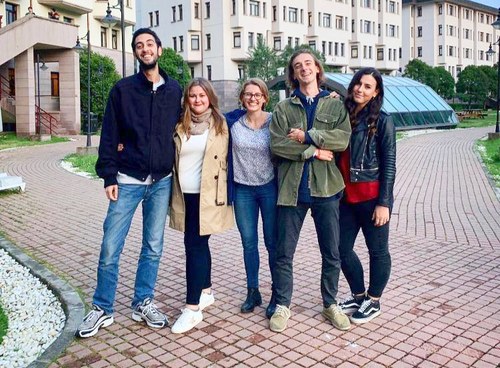
Bringing people together by sharing food. It is an idea as simple as it has a high social impact, the one behind the 'Il Mondo a Tavola' project (The world at the table), conceived by a group of five students of the Bachelor in Psychological Sciences and Techniques of the University of Bologna. An idea that brought to Adele Miniati, Chiara Neri, Laura Bruhn, Leonardo Serafini and Pier Matteo Fabbri, the prize for the best ERASMUS Plus "Peacemakers" project, born to develop international teaching activities useful for promoting peace and social inclusion activities.
According to the panel composed by the heads of the project units of the universities of Humboldt (Berlin), Erasmus (Rotterdam), Koch (Istambul), Gaziantiep (Turkey) and Aberta (Lisbon), the project of our students was able to respond in the most effective way to the challenge assigned: develop an integration project involving both university students and numerous social and institutional entities dedicated to social integration.
The project was born from a discussion on the idea that bread, piadina, pizza, pitta and other baked goods are the basic food elements of the Mediterranean area that welcome a varied range of foods, demonstrating thus versatility and willingness to integrate different elements. Scientifically, the idea is rooted in the contact hypothesis of Allport (1954), which explains how contact with members of an external group, if characterized by positive conditions, can reduce prejudice and increase a feeling of empathy towards athe entire external group. And so, under the guidance of Professor of Social Psychology Monica Rubini, they moved from food ... to human groups.
During the design of the project, the students identified a critical aspect of the society in which we live: our narrative on migration is built through comparison with other Italians, while migrant communities tend to "ghettoize" to find security in their cultural identity.
"We decided that our project had to aim to create a link between the different communities of migrants and locals, and at the same time make available places where it is possible to have direct experience of knowledge and deal with diversity," say the students involved in the project. "Only in this way, both migrants and locals can update and modify the opinions and representations of the migratory phenomenon and of the other group, having as a criterion the direct link with the different communities, in order to develop a narrative that is based as much as possible on reality."
The result of this reflection took shape on November 26th, 2019, at the Auser Primavera 3 headquarters in Cesena, where 100 young people from Modena, Faenza, Castelfranco Emilia, Cameroon, Benin, Morocco, Senegal and Ivory Coast, had way of sharing the table and their world view. The project involved the Municipality of Cesena, press representatives, migrant associations and, among others, the Rotary Club of Cesena, the VALUES project (an EU project that aims to share integration policies and practices between various cities) and the network of associations Comunità Accogliente.
Another important goal achieved was the creation of a permanent table where migrant associations and the Municipality of Cesena can meet and discuss problems and devise solutions. "The hope is that this network can contribute to the creation of significant and impactful projects and interventions, which in turn implement positive attitudes, improve cultural exchanges and social well-being," adds Prof. Rubini.
After the success of the first event, the group of students of "Il Mondo a Tavola" aims to organize new dinners and events in which the local and migrant community, together with the students, can strengthen the bond they have already created.